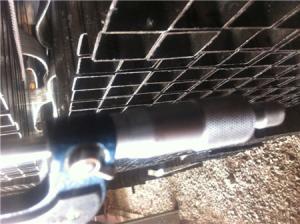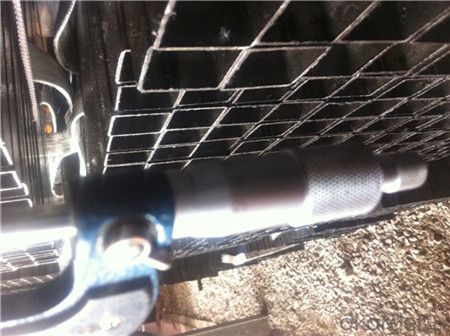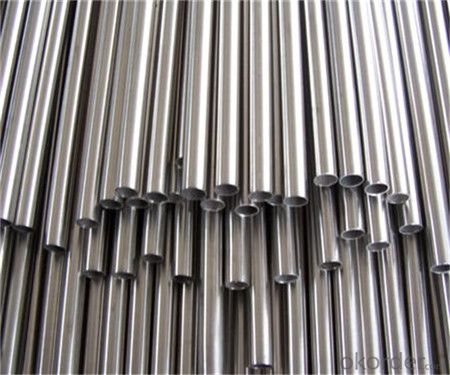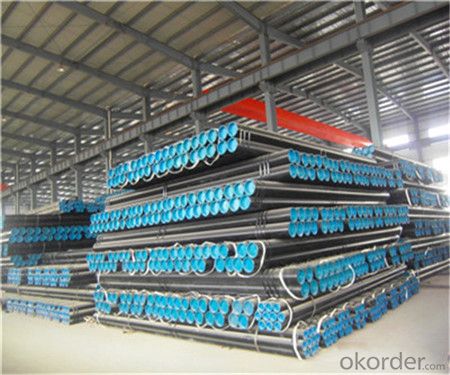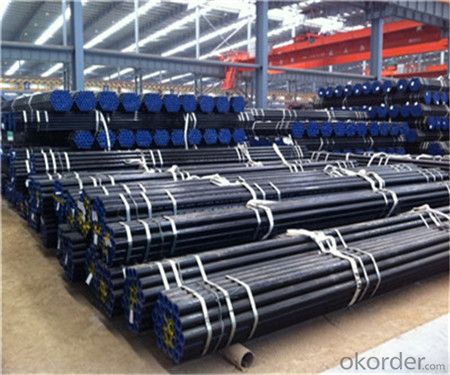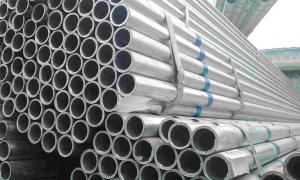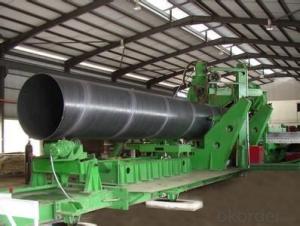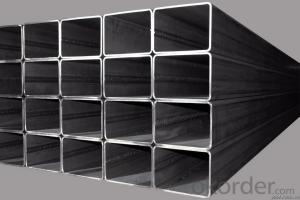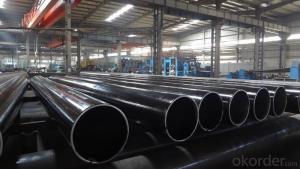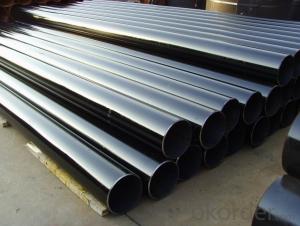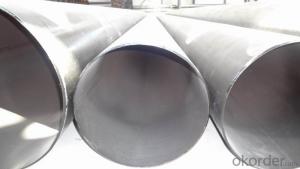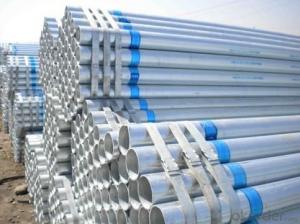ASME API 5L SSAW Steel Tube With Good Quality
- Loading Port:
- Tianjin
- Payment Terms:
- TT or LC
- Min Order Qty:
- 25 m.t.
- Supply Capability:
- 10000 m.t./month
OKorder Service Pledge
OKorder Financial Service
You Might Also Like
1、Structure of Welded Steel Tube:
Welded Steel Tube is formed by drawing a solid billet over a piercing rod to create the hollow shell. It is widely used in many field. Such as construction and so on.We are company that have many years experience and professional manager team and engineer team and sales team, sure we will provide you high quality of welded pipe and professioanl service. We pay great attention to after-sale service and aim to be your first choice in the future business cooperation. We hope we could be your career partner. If you need welded steel pipe, pls turn to us for help. We will try our best to satisfy your need.
2、Main Features of the Welded Steel Tube:
• High manufacturing accuracy
• The higher strength
• The small inertia resistance
• Strong heat dissipation ability
• Good visual effect
• Satisfy price
3、Welded Steel Tube Specification:
Standard | GB, DIN, ASTM ASTM A106-2006, ASTM A53-2007 |
Grade | 10#-45#, 16Mn 10#, 20#, 45#, 16Mn |
Thickness | 8 - 33 mm |
Section Shape | Round |
Outer Diameter | 133 - 219 mm |
Place of Origin | Shandong, China (Mainland) |
Secondary Or Not | Non-secondary |
Application | Hydraulic Pipe |
Technique | Cold Drawn |
Certification | API |
Surface Treatment | factory state or painted black |
Special Pipe | API Pipe |
Alloy Or Not | Non-alloy |
Length | 5-12M |
Outer Diameter | 21.3-610mm |
Grade | 20#, 45#, Q345, API J55, API K55, API L80, API N80, API P110, A53B |
Standard | ASME, ASTM |
1) Material:20#(ASTM A 106/A53 GRB.API5LGRB,GB),45#,16Mn,10#.
2) Specification range:OD:21.3-610mm,WT:6-70mm,length:6-12m or according to the requirement of clients.
3) Excutive standards:GB,ASME API5L.ASTM A 106/A53,Despite of the above standards,we can also supply seamless steel pipe with standard of DIN,JIS,and so on,and also develop new products according to the requirements of our clients!
4) Surface:black lacquered,varnish coating or galvanized.
5) Ends:Beveled or square cut,plastic capped,painted.
6) Packing:bundles wrapped with strong steel strip,seaworthy packing.
4、Packaging & Delivery
Packaging Details: | seaworthy package,bundles wrapped with strong steel strip |
Delivery Detail: | 15-30days after received 30%TT |
5、FAQ of Welded Steel Tube:
①How is the quality of your products?
Our products are strictly in accordance with international and domestic standard. We test on every pipe before delivery. Any quality certification or testing report you want to see, please tell us.
Guaranteed: If products’ quality is not in accordance with description as we provide or the promise before you place order, we promise 100% refund.
②How about the price?
Yes, we are factory and be capable of offering you the lowest price. One of our policy is that “ to save time and be absolutely honest with our business relationship, we quote as low as possible for every client, and discount can be given according to the quantity”, if you are interested in bargain and dissatisfy our factory price, just don’t waste your time. Our quotation is professional.
③Why should you choose us?
Choice happens because of our quality and price. Additionally, we can also offer professional products inquiry, products knowledge train (for agents), fast goods delivery, outstanding customer solution proposals. Our service formula: good quality + good price + good service=customer’s trust.
SGS test is available. Customer inspection before shipping is welcome. Third party inspection is OK.
6、 Welded Steel Tube Images:
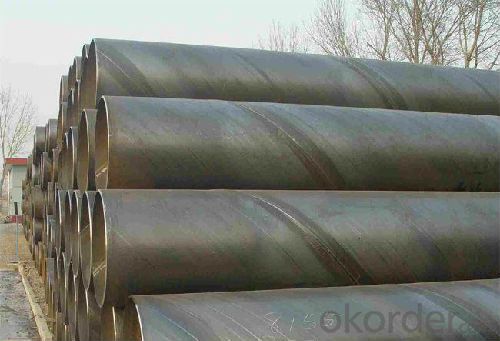
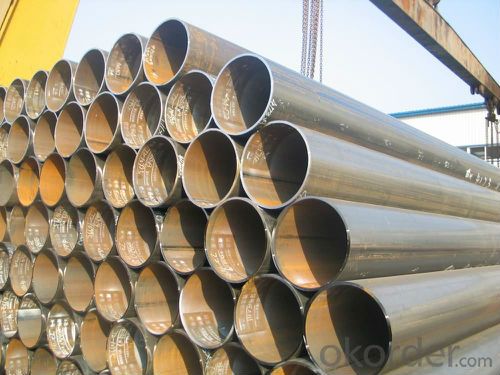
- Q: What is the difference between black steel pipes and galvanized steel pipes?
- The main difference between black steel pipes and galvanized steel pipes lies in their coating. Black steel pipes are uncoated and have a dark, iron oxide layer on their surface, while galvanized steel pipes are coated with a layer of zinc to protect against corrosion. This zinc coating gives galvanized pipes a shiny, silver appearance and makes them more resistant to rust and other environmental factors.
- Q: What is the difference between steel pipe and ductile iron pipe?
- Steel pipe and ductile iron pipe are commonly utilized in various industries to transport fluids and gases. Nevertheless, there exist notable distinctions between the two materials. One primary difference lies in their composition. Steel pipe primarily consists of iron and carbon, with additional alloying elements to enhance strength and corrosion resistance. Conversely, ductile iron pipe is a form of cast iron that has undergone treatment to improve ductility and toughness. It contains higher levels of carbon and silicon, along with small amounts of other elements like magnesium and copper. Another difference is their strength and durability. Steel pipe is renowned for its high strength, enabling it to endure greater pressures and stresses compared to ductile iron pipe. It also exhibits superior resistance to impact and bending, making it suitable for applications requiring robustness. Ductile iron pipe, although not as strong as steel, still offers good strength and durability, particularly in scenarios involving external damage or heavy loads. Corrosion resistance is another crucial factor. Steel pipe typically exhibits greater resistance to corrosion due to the inclusion of alloying elements such as chromium and nickel. This renders it well-suited for applications prone to high corrosion risks, like pipelines carrying corrosive fluids. Ductile iron pipe, while possessing some corrosion resistance, may necessitate additional protective coatings to enhance its durability in corrosive environments. Installation and maintenance also differ between these two pipe types. Steel pipe is generally lighter and more manageable, facilitating easier installation. It also allows for welding, thereby providing greater construction flexibility. Ductile iron pipe, being a cast iron material, requires more specialized installation techniques such as mechanical joints or flanges. If mishandled, it is also more prone to cracking during installation. In terms of cost, steel pipe typically incurs higher expenses compared to ductile iron pipe. This stems from the higher cost of raw materials and the additional processing involved in steel pipe production. However, it is crucial to consider the overall lifecycle cost, as steel pipe's increased strength and corrosion resistance may result in lower maintenance and replacement expenses in the long run. In conclusion, while both steel pipe and ductile iron pipe have their respective advantages and applications, the choice between the two depends on factors such as strength requirements, corrosion resistance, installation methods, and budget considerations. Careful assessment of these factors will aid in determining the most suitable pipe material for a specific application.
- Q: What are the different methods of measuring the thickness of steel pipes?
- There are several methods that can be used to measure the thickness of steel pipes, including ultrasonic testing, magnetic particle inspection, eddy current testing, and laser scanning.
- Q: Can steel pipes be used for conveying hazardous chemicals?
- Certainly, hazardous chemicals can indeed be conveyed through the use of steel pipes. Renowned for their exceptional strength and durability, steel pipes are ideally suited for the handling of various substances, including those that are hazardous. Their ability to withstand both high pressure and temperature ensures the secure transportation of these chemicals. Furthermore, steel pipes possess outstanding resistance to corrosion, a critical factor when dealing with potentially dangerous and corrosive materials. In addition, the ease with which steel pipes can be welded and connected allows for the establishment of a dependable and impervious transport system. Nevertheless, it is imperative to carefully consider the specific requirements of the chemicals being transported and diligently ensure that the steel pipes are appropriately designed, coated, and maintained, thereby averting any potential risks or reactions that may arise with the hazardous substances.
- Q: Are steel pipes suitable for HVAC systems?
- Yes, steel pipes are suitable for HVAC systems. They are commonly used in HVAC installations due to their durability, strength, and resistance to high temperatures and pressures. Steel pipes also provide excellent corrosion resistance, making them ideal for long-term use in heating, ventilation, and air conditioning systems.
- Q: What are the advantages of PVC pipe and galvanized steel pipe?
- PVC pipeline use temperature is -5 to 90 degrees or so, according to the current market price of around 6000 yuan per ton, the price is cheap. Its corrosion resistance is good, can resist most of the acid and alkali, and unlike the steel pipe that is easy to rust, so in the construction of the upper and lower water pipes and other fields have gradually replaced the trend of steel pipe.
- Q: Which is cheaper, angle iron or steel pipe?
- Angle called angle, the steel strip is perpendicular to each other on both sides into the corner. There are equal angles and unequal angles. The two sides of an equal angle steel are equal in width. The specifications are expressed in millimeters of edge width * edge width * edge thickness. Such as "/ 30 x 30 x 3", that is 30 mm width equal angle, edge thickness of 3 mm. Also available models that model is the number of centimeters wide, such as angle 3#.
- Q: Can steel pipes be used for underground power transmission?
- Yes, steel pipes can be used for underground power transmission. Steel pipes are commonly used for underground power transmission due to their durability, strength, and resistance to corrosion. They provide a reliable and secure conduit for transmitting power underground while protecting the electrical cables from external elements.
- Q: How are steel pipes protected against internal scaling?
- Steel pipes are protected against internal scaling through a process called internal coating or lining. This involves the application of a protective layer on the interior surface of the pipe to prevent the formation of scales or deposits. There are several methods used for this purpose. One common method is the application of epoxy coatings. Epoxy is a durable and corrosion-resistant material that forms a continuous barrier on the inside of the pipe. It helps to prevent the accumulation of minerals and other substances that can lead to scaling. Epoxy coatings are often applied by spraying or brushing onto the pipe's interior surface and then cured to form a hard and smooth finish. Another method used for protecting steel pipes against internal scaling is cement mortar lining. In this process, a layer of cement mortar is applied to the inside of the pipe. The cement mortar acts as a barrier against scaling and also provides additional protection against corrosion. This lining process is commonly used for large-diameter pipes that are used in water distribution systems. Polyethylene (PE) lining is another technique employed to protect steel pipes from internal scaling. PE lining involves the insertion of a high-density polyethylene liner into the pipe. This liner acts as a barrier against scaling and also helps to reduce friction, improving the flow of fluids through the pipe. PE lining is often used in applications where a smooth interior surface is required, such as in oil and gas pipelines. In addition to these methods, regular maintenance and cleaning of the pipes can also help prevent internal scaling. This may involve the use of chemical cleaning agents or mechanical cleaning techniques to remove any deposits that have formed on the pipe's interior surface. Overall, protecting steel pipes against internal scaling is crucial to maintain their efficiency and prolong their lifespan. By utilizing various coating and lining methods, as well as implementing proper maintenance practices, the risk of internal scaling can be significantly reduced.
- Q: How are steel pipes protected against rust?
- Steel pipes are protected against rust through a variety of methods. One common method is by applying a protective coating to the pipes. This can be done by using a layer of paint, epoxy, or a corrosion-resistant coating such as zinc or galvanized coatings. These coatings act as a barrier between the steel and moisture, preventing the formation of rust. Another method of protecting steel pipes against rust is by using cathodic protection. This involves the use of sacrificial anodes, typically made of zinc or magnesium, which are attached to the steel pipes. These anodes corrode instead of the steel, sacrificing themselves and preventing rust formation on the pipes. In addition to coatings and cathodic protection, steel pipes can also be protected against rust by using corrosion inhibitors. Corrosion inhibitors are chemicals that are added to the water or fluid flowing through the pipes. These chemicals form a protective film on the surface of the steel, inhibiting the corrosion process and preventing rust from forming. Regular maintenance and inspections are also crucial in protecting steel pipes against rust. Any signs of damage or wear on the protective coatings should be addressed promptly to prevent rust from developing. Additionally, ensuring that the pipes are properly cleaned and dried before applying any protective coatings can also help in enhancing their effectiveness. Overall, a combination of protective coatings, cathodic protection, corrosion inhibitors, and regular maintenance is employed to ensure that steel pipes are effectively protected against rust and corrosion, prolonging their lifespan and maintaining their structural integrity.
Send your message to us
ASME API 5L SSAW Steel Tube With Good Quality
- Loading Port:
- Tianjin
- Payment Terms:
- TT or LC
- Min Order Qty:
- 25 m.t.
- Supply Capability:
- 10000 m.t./month
OKorder Service Pledge
OKorder Financial Service
Similar products
Hot products
Hot Searches
Related keywords
